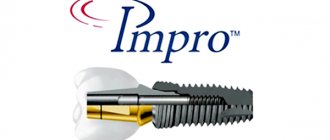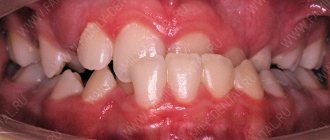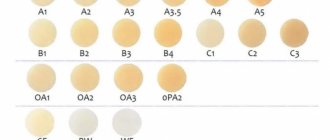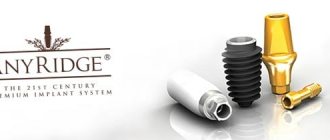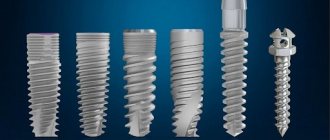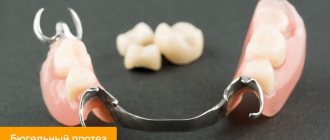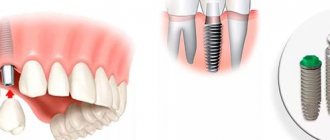Implantation is the installation of artificial teeth to replace lost natural teeth. Titanium roots are implanted into the jawbone and covered with artificial crowns. As a result, the functions of the tooth are completely restored - aesthetic and functional. With the help of implantation, you can restore either one tooth or several. The method is gaining great popularity and is becoming available to all patients.
Who needs full jaw implantation?
Lack of teeth (edentia) is not only a cosmetic defect. Along with their loss, speech, chewing and even swallowing are impaired. With prolonged edentulism, due to the resorption of bone tissue, the shape of the jaw changes and the face becomes asymmetrical. A person cannot fully communicate, gradually falls out of society and rapidly ages. The functioning of the gastrointestinal tract is disrupted, which affects the condition of all organs and systems.
Therefore, restoring the dentition is a person’s return to normal life, the opportunity to receive joy from communicating with loved ones.
Medicine has solved this problem. The dentition can be completely painlessly restored by installing a denture supported by implants, and it will not take much time. Implantation in the absence of teeth is indicated for patients:
- with a toothless upper or lower jaw;
- with complete absence of teeth in the oral cavity;
- with scattered absence of 5 or more teeth in the dentition.
Should I get an implant or choose prosthetics?
Implantation does not have the disadvantages of traditional prosthetics - it is the only way to restore dentition for life.
Advantages
- Any number of teeth can be restored
- smile aesthetics, neat appearance
- natural restoration of the jaw bone, no atrophy
- adjacent units are not ground
- no pressure on the gums, no contact with mucous membranes
- even hard food can be chewed without problems
- fast addiction
- no speech impairment
- lifetime service life
- If the prosthesis needs to be replaced, only it is changed. The implants remain in the jawbone and a new orthopedic design is fixed on them
Flaws
- an expensive operation - but if you consider that implants are installed for life, and crowns on them last at least 20 years, the benefits are obvious
- limitations - currently there are fewer and fewer contraindications to implantation, new techniques are being developed, improved artificial roots are being created
- surgical intervention - installing an implant is no more difficult than tooth extraction
- long-term process - with classical implantation, time is required for the implant to heal, during which time the patient wears a temporary butterfly immediate prosthesis, but with an accelerated one-stage technique, under favorable conditions, the crown is fixed immediately after installation of the implant
To summarize: implantation is the most functional and physiological way to restore teeth. If you choose a trusted clinic and a qualified implantologist, installing implants does not carry any risks or complications, and the new tooth will last a lifetime.
Related article:
- Which is better: implantation or prosthetics?
Why is full dental implantation better than traditional dentures?
Full dental implantation into the jaw has a number of advantages over traditional removable and other types of prosthetics. This technology:
- creates conditions for fastening prostheses and ensures their reliable fastening; a removable denture is an unreliable design and often requires additional reinforcement;
- ensures complete restoration of chewing and speech function without causing a gag reflex;
- has an excellent aesthetic effect - the appearance of the dentition is even better than that of a natural one;
- helps the patient quickly get used to the new “teeth”;
- the prosthesis installed on its basis exerts uniform pressure on the jaw tissue, preventing them from decreasing in volume, unlike a removable denture, which causes gradual absorption (resorption) of the jaw bone tissue.
Contraindications for implantation
Before performing an implantation procedure, the dentist must check the patient for possible contraindications. They are divided into several varieties.
Absolutes include the following:
- blood diseases;
- if there are malignant tumors;
- with immune pathology;
- if there are diseases of the central nervous system;
- if bisphosphonates are taken orally;
- in the presence of lupus erythematosus, rheumatoid arthritis, rheumatism, scleroderma;
- if you have tuberculosis;
- if there is recurrent stomatitis or pemphigus;
- if the function of the masticatory muscles is impaired;
- diabetics.
Relative contraindications include the following:
- Lack of oral sanitation.
- Poor oral hygiene (this is a good reason to prescribe removable dentures).
- For gingivitis.
- If there is marginal periodontitis.
- For pathological bites.
- For diseases of the temporomandibular joint.
- If there is severe atrophy or damage to bone tissue.
- If the patient smokes, drinks alcohol and drugs.
- When pregnant.
General contraindications consist of the following:
- Surgical reasons for refraining from any intervention.
- Contraindications to pain medications (negative tolerance to anesthesia).
- Certain somatic diseases that may be affected by the procedure (these include endocarditis and other heart diseases, rheumatism, etc.).
- Certain treatment methods can have an impact on the regeneration and preservation of the dental element after installation, on the tissue surrounding the dental element (if various types of depressants, anticoagulants, cytostatics and other agents are used).
- Diseases of the central nervous system.
- Distress syndrome (severe and prolonged stress, which is caused by all sorts of reasons).
- If there is exhaustion of the body.
- Poor oral hygiene (this is a good reason to prescribe removable dentures).
Local contraindications consist of the following:
- unsatisfactory tendency to oral hygiene;
- insufficient presence of bone tissue or its inappropriate structure;
- unsatisfactory distance to the maxillary and nasal sinuses.
Temporary contraindications include the following:
- acute diseases;
- rehabilitation and health stages;
- pregnant condition;
- addiction;
- condition after irradiation (the implantation procedure can be done after a year).
Implantation technologies for complete absence of teeth
In case of edentia, complete implantation of teeth into the jaw can be carried out in different ways, followed by the installation of a fixed or removable prosthesis. The doctor decides which technology to choose for a particular patient.
Classic full dental implantation
Fixed implantation of several teeth
This technology ensures maximum comfort of the prosthesis. To install it, a specialist can use different methods of dental implantation:
- Classical implantation – implants are installed in the area of the tooth sockets (alveoli) in place of the extracted teeth. This is the optimal type of implantation, allowing you to completely restore both the upper and lower teeth. But it is rarely used, since installing such a number of implants requires excellent bone tissue condition. With complete absence of teeth in most patients, the bone plate becomes thinner, which is a contraindication for classical implantation. To perform classic implantation, it is often necessary to strengthen the jaw bone tissue using an additional sinus lift operation. Implants are used that consist of a titanium root and an adapter attached on top - an abutment. As a rule, this is a two-stage procedure: first, implants and temporary crowns are installed, and six months after the titanium root has healed (osseointegration), the temporary crowns are replaced with permanent ones.
- Basal – implants are inserted not into the sockets, but into the deep bone layers. For this type of complete dental implantation, the condition of the jaw bone plate does not matter, since the deep bone tissues do not lose their volume and strength. The operation is low-traumatic, since the gum is not injured; it is simply moved back and a hole is drilled into the bone, into which monolithic, non-separable implants, consisting of a titanium root and a permanent abutment, are screwed at an angle. The operation is one-stage: immediately after installing the implant, a permanent crown with a load is installed on it. Basal implantation is performed when there is a lack of bone tissue and prolonged adentia (more than two years). It is especially indicated for older people.
- Zygomatic implantation – is carried out when the upper jaw is edentulous and the bone tissue is thinning, which does not allow for classical dental implantation. Special implants (Nobel-Zygoma) of much longer length than conventional ones are screwed into the cheekbone, after which a permanent prosthesis can be attached to them. The zygomatic bone is stronger than the jaw bone; it does not decrease in volume and reliably holds the implant. Zygomatic implantation can be combined with dental implantation. With complex dental implantation, several additional dental implants are installed using the classical or basal method. Then prosthetics are carried out: installation of a bridge on implants - a feature of this type is the possibility of prosthetics 2 - 3 days after implantation of titanium roots; First, temporary prosthetics are performed for a period of 2–3 years, and only then permanent;
- zygomatic implantation with subsequent installation of a bridge is an expensive procedure, but the costs pay for themselves: the bridge is securely strengthened and over time the patient feels it like his own teeth; chewing and diction - as with natural dentition.
1) All-on-4, 2) All-on-6
Conditionally removable implantation in complete absence of teeth
The main disadvantage of a conventional removable structure is its insufficient fixation in the oral cavity. This creates problems when chewing food and also negatively affects diction. The appearance of this design also leaves much to be desired.
Currently, in case of complete edentia, implantation is carried out followed by the installation of a conditionally removable structure. It is called so because it requires considerable effort to remove it. It is securely fixed in the oral cavity, allows the patient to chew any food and does not interfere with conversation. Most types of conditionally removable dentures can be removed and put on independently once every 2 to 3 weeks for complete cleansing.
Several technologies for conditionally removable prosthetics have been developed:
- Beam-supported implants . Before installation, a thorough diagnosis is carried out: implants can be installed only if there is sufficient height of the alveolar bone crest. At least 4 implants are installed on the upper jaw (sometimes there can be up to 8); on the lower jaw, 3 to 4 are usually sufficient. After this, the implants are connected with a titanium plate (beam) - it will promote uniform load and prevent bone resorption. After this, an impression is made to make the prosthesis. Inside the prosthesis there will be a special fastening and recesses that allow you to snap the structure into place. It will stay firmly in your mouth, allowing you to chew food and pronounce words clearly. On the upper jaw there is a prosthesis without a palatal wall, on the lower jaw - with less massive artificial gums. The operation is usually carried out in two stages: first, implants are installed, and then, several months later, after implantation of the titanium root, a conditionally removable prosthesis is installed. In rare cases, with sufficient bone density, a one-stage operation with installation of a prosthesis within three days is possible. This is the most expensive, but also the most effective type of conditionally removable prosthetics on implants. Advantages: reliability and fairly long wearing life - about 5 years.
- Implants fixed with ball-shaped abutments . Implantation is carried out in the same way as with the beam method. A ball-shaped abutment is placed on the implanted implant. Holes are made in the prosthesis opposite the spherical head of the abutment. The abutment fits into the hole and snaps into place. Collapsible implants with spherical abutment heads are used. Advantages: relatively inexpensive method of prosthetics. Disadvantages: not very reliable, since over time the structure becomes loose, has a short wear life (2 - 3 years), after which it needs to be replaced. In addition, uneven load on the jaw leads to local atrophy of bone tissue.
- Locator equatorial abutments . The mechanism is the same as the ball mounting system. But the abutment is not spherical, but cylindrical. The technology and implants for it were developed by Straumann and are characterized by greater reliability, correct load distribution and a fairly long service life (4 - 5 years). The disadvantages of locators include their higher cost compared to ball-shaped mounts.
- Implants are screwed onto the prosthesis and can only be removed by a dentist . The advantage of the method is the stability of the structure and relatively affordable cost, the disadvantages are uneven load distribution and rapid wear (wearing period 2 - 3 years).
Full jaw implants on a beam support
Implantation immediately after tooth extraction
Based on statistics, surgery on the lower jaw is more successful than installing implants on the lower jaw. This factor depends on different bone densities.
As a result of an immediate operation, where there is an immediate load on the dental element, the possibility of rejection of the implant from the bone tissue increases. In many cases, complications can arise due to the characteristics of the human body to foreign elements. In principle, the percentage of complications from the instant technique to other implantation methods is almost the same.
The main advantage of using this technique is that the implant can be installed immediately after removing the diseased tooth. If there is a chronic infectious focus on the upper part of the tooth root that will be removed, then this is an indicator of the risk of complications in a minimal percentage.
But this also does not serve as a contraindication to the procedure. If the patient is a smoker, then dentists do not recommend using this method of dental restoration. Also, such an operation cannot be performed if you have osteoporosis or poor oral hygiene.
If the patient does not want to waste time going to the dental clinic, then with this method they can remove the diseased tooth and immediately install an implant. For many, this is an undeniable advantage.
Important : It must be taken into account that when carrying out immediate dental implantation, in many cases it is necessary to plant bone tissue, and a barrier membrane can also be used. It is necessary in order to regenerate bone. The use of a fit is necessary in situations where the diameter of the dental element is smaller than the size of the puncture at the site of the extracted tooth. That is, between the dental element and one of the bone walls there will be an empty space that needs to be filled with bone material.
Types of implants for complex implantation
The peculiarities of a one-stage operation are that a temporary or permanent prosthesis is immediately put on the implanted implant. Therefore, the ideal implant for one-stage implantation should be monolithic, that is, the titanium root should not be detached from the abutment. Although collapsible structures can also be used, they are less convenient and functional for this type of implantation.
Features of the structure of implants for one-stage dental implantation:
- monolithic structure - the root is firmly connected to the abutment; this reduces the risk of fractures in the area of the implant neck, the development of infection in the gap between the root and the abutment, and also contributes to a more even distribution of the load on the jaw bone tissue;
- cone-shaped root with aggressive thread - when screwing in such a root, the hole should have a smaller diameter than the titanium rod; it aggressively screws into the bone, creating a reliable support for the prosthesis; in this case, bone compaction occurs (autospreading);
- material – pure titanium (Grade 4 with a minimum of impurities), or with a small percentage of vanadium and aluminum impurities (Grade 5); impurities make the material more durable, but reduce the rate of implantation of the titanium root; All materials are hypoallergenic and take root well in tissues.
After one-stage implantation, it is possible to perform fixed (bridge) or removable (beam, spherical, equatorial, screw fastening of the prosthesis) prosthetics.
Many global manufacturers produce monolithic implants for one-stage dental implantation. Based on cost, implants are divided into three price categories: premium, medium and budget.
| Brand | % survival rate | Survival rate | Guarantee | Class |
| Nobel biocare, USA Zygomatic bone implant Nobel-Zygoma | 99,4% | accelerated | lifelong | premium |
| Straumann, Switzerland | 99,4% | accelerated | lifelong | premium |
| ROOTT, Switzerland | 99,3% | accelerated | lifelong | premium |
| Denti System, Germany | 99,4% | accelerated | lifelong | premium |
| Alpha Bio, Israel | 99,6% | accelerated | lifelong | average |
| Osstem, South Korea | 99,2% | accelerated | lifelong | average |
| Conmet, Russia | 99% | regular | lifelong | budget |
How many implants are needed if there are no teeth?
At least 4 implants are installed on a toothless upper jaw, but sometimes, with severe rarefaction and thinning of the jaw bone, more are required. With classic and basal implantation, up to 14 implants are installed on each side.
Fewer implants are installed in the lower jaw, since the bone there is stronger and less susceptible to resorption. Usually 3–4 designs are enough.
The doctor decides how many implants to place on each jaw. This depends on the bone volume and the patient's budget.
Complications following dental implantation
The use of modern implantation methods and high-quality dental products has made it possible to increase the popularity of this method over the previous twenty years. On average, the survival rate of dental elements over a period of 7-10 years is currently at almost one hundred percent success level. Moreover, success rates in the lower jaw are higher than in the upper jaw. This depends on the fact that the lower jaw bone is the densest.
To conclude, rejection of dental elements is not common, and the main reason for patient dissatisfaction is the deterioration of the aesthetic appearance where the gums are adjacent to the dental element. At the initial stage, it may look like a not very noticeable cyanosis of the gums, which will increase over time. Over time, gum recession may occur, that is, the neck of the dental element may be exposed.
This all occurs due to bone resorption near the neck of the dental element, as a result of which the metal part of it, which is deprived of bone tissue, begins to be visible through the gums, which gives a bluish appearance. The subsequent decrease in bone level results in loss of bone support and a reduction in bone level following the bone. Gum recession appears.
Based on practice, the occurrence of bone resorption and recession is only caused by errors and shortcomings of the treating dentist. The most common mistakes are:
- There is a thin bone wall (less than two millimeters) on the side of the front surface of the dental element, and the dentist, observing this, did not replant the bone, which leads to resorption of the upper part of this bone wall.
- Thin gum (two millimeters or less) on the jaw crest of the alveolar process, which does not allow the formation of the required volume of soft tissue near the dental element, and the dentist, observing this, did not increase the thickness of the gum. This could be done by transplanting a small flap of mucous membrane from the palate.
- Small distances (less than three millimeters) that separate the lateral surfaces of the dental element from the adjacent teeth or other dental elements, which leads to resorption of the lateral bone septa and a decrease in the level of interdental papillae.
In addition, there are other reasons, so you need to contact a competent specialist.
Stages of implantation in complete absence of teeth
If you have a toothless jaw, dental implantation and subsequent prosthetics can be done using different technologies. Which one to choose is determined by the dental surgeon together with the orthopedist.
Preparation for complex implantation
At the preparation stage, the doctor selects the most suitable type of implant for the patient.
The main goal of preparing for dental implantation is to identify indications and contraindications for its implementation. The patient is first examined by the dentist, asking him about past illnesses, the presence of chronic pathology, and medications taken. After this, laboratory blood tests are prescribed (coagulability must be checked), plain radiography and computed tomography, which allows one to determine the quality and volume of the jaw bone tissue. All this can be done within one day.
After a comprehensive examination, the dentist offers the patient a choice of various options for solving the problem. The patient chooses the option that is most suitable for him in terms of time and budget.
Implant installation
The process of one-stage prosthetics can be divided into the following parts:
- Anesthesia . Most often, one- or two-stage implantation takes place under local anesthesia. Since several implants are being installed, conduction anesthesia is mainly used to disable the sensitivity of the nerve innervating the jaw. The most sensitive patients are sometimes given general or intravenous anesthesia. When using one or another type of anesthesia, the doctor must be sure that the patient will not feel any discomfort or pain.
- Implantation . Depending on the chosen method, implants are inserted into the cells of the tooth, the deep basal layers of the jaw bone or into the zygomatic bone. With one-stage implantation, a monolithic, non-separable implant is installed, the abutment will be located above the gum in the oral cavity. In a two-stage operation, the doctor must implant only the root (titanium post) and place sutures in the gum above it.
- Prosthetics . In a one-stage operation, prosthetics are performed immediately, a temporary or permanent prosthesis is installed. After osseointegration (after 4–5 months), the temporary prosthesis is replaced with a permanent one. If two-stage implantation was carried out, prosthetics are performed only after 4–5 months. The gum is cut, the abutment is screwed in and the prosthesis is put on it.
How much does it cost to implant one tooth?
Instant or express dental implantation, the cost of which can vary significantly from 40 to 100 thousand rubles, is considered a fairly economical option compared to other methods. Express implantation saves time, since the implantation process can take place in just a few days, without losing the quality of the installation. Thanks to a small incision in the gum, the implant and the tooth crown itself are installed in a short period of time. Among those who need effective and quick results, this method of dental implantation is considered very popular.
How does dental implantation occur?
Dental implantation is the process of implanting an implant that performs the function of a tooth root. This procedure can take place either in one stage or in two stages. Dental implantation, the cost of which is quite affordable, is today considered a leading trend in dentistry.
What is turnkey implantation?
But turnkey implantation is still considered the most convenient and popular. This method of implant installation involves performing all the necessary procedures in one clinic at a set price. Turnkey implantation may include: a consultation with a doctor who assesses the condition of the oral cavity and considers the possibilities of carrying out the necessary procedure; X-ray of the jaw bones to determine its condition and the condition of the gums; directly, the implantation itself, depending on the type of operation chosen. Thus, the dentist performing turnkey implantation conducts full monitoring of the implantation process, manufactures and installs a crown, and brings the installation to its full logical conclusion, namely, the complete restoration of the patient’s attractive smile.
Features of working with the upper and lower jaw
The upper and lower jaws have distinctive tissue structure features. When fully implanting teeth, these features must be taken into account.
Full dental implantation of the lower jaw
The bone of the lower jaw is dense and massive, it is slowly resorptionable, so with complete implantation, 3 to 4 implants are sufficient to install the prosthesis. Osseointegration (implantation of an artificial root) in the lower jaw ends quite quickly: after 2–3 months (the period also depends on the individual characteristics of the patient’s body), the temporary prosthesis can be replaced with a permanent one.
Full dental implantation of the upper jaw
Here the bone is thinner. It is easily resorptionable, so it is very often impossible to carry out dental implantation without additional bone tissue augmentation. With a mild degree of resorption, dental implantation is carried out, but not 3-4 implants are installed, as in the lower jaw, but more, up to 8. If this type of implantation is not possible, zygomatic implantation is performed - special elongated implants are inserted into the zygomatic bone. Sometimes zygomatic implantation is combined with dental implantation - in addition, several conventional implants are installed in the alveolar process of the jaw.
What explains the popularity of implants?
Implantation has been known in dentistry for about 50 years, and all this time clinical studies of implants have been conducted, their design has been improved for better osseointegration and minimizing the percentage of rejection. Implantologists' forecast for the future is that in the next 10 years the popularity of the method will increase 3-4 times. There are good reasons for this:
- the quality of implants is improving, they are easy to install;
- complications occur in 2% of cases and are almost always eliminated with timely treatment at the clinic;
- tooth loss is common even in young people, and for such patients comfort and aesthetics are important, which can only be achieved by installing implants;
- the survival rate of artificial roots is close to 100%, the success of implantation is higher than even conventional therapeutic treatment;
- treatment time is reduced due to the development of new technologies;
- information becomes more accessible to patients of all ages.
Recommendations after replacing all teeth with implants
After implantation, in the absence of teeth, tissue healing and osseointegration occur—the implantation of a titanium root into the jaw tissue. The speed of these processes largely depends on the correct implementation of the dentist’s recommendations for oral care and adherence to the regimen.
You should also know that after dental implantation surgery, you may experience pain, tissue swelling, and even loss of sensitivity for three to five days. Sometimes a slight fever rises. All this is considered the norm.
During the normal course of the post-implantation period, in the first days, for rapid tissue healing, elimination of inflammation, swelling and pain, experts recommend:
- be in such a position that your head is higher than your body, and sleep on a high pillow at night; this way there will be less swelling and pain;
- apply cold to the cheek - ice or a napkin dipped in cold water;
- take baths with miramistin, furatsillin or chlorophyllipt several times a day;
- You can drink water at room temperature after 3 hours, eat - after 5 hours after implantation; food should be crushed, soft, not hot;
- take an analgesic if the pain seems very strong - Naise 100 mg tablet or long-acting Ketorol capsule 150 mg.
You should not: smoke, drink alcohol, rinse your mouth (this can mechanically damage injured tissue), chew solid food.
In order for root implantation to proceed as quickly as possible, you need to:
- lead a healthy lifestyle, move more, spend more time in the fresh air, avoid high physical activity and severe stress - all this reduces the body’s ability to regenerate;
- eat properly, fully, but avoid too hard foods; the first month the food should be soft, then the hardness can be increased very gradually;
- reduce the number of cigarettes smoked as much as possible (or better yet, not smoke at all);
- It is undesirable to frequently drink alcohol, strong tea and coffee - vasoconstriction will adversely affect osseointegration;
- Be careful with thermal water procedures, especially in the first month after surgery (bath, sauna, hot bath).
Caring for implants installed on several teeth
- the first week after surgery - only oral baths with antiseptic solutions;
- from the second week you can clean the denture (without removing it) twice a day with a soft-bristled brush;
- from the third week you can use special devices for washing hard-to-reach places in the prosthesis - irrigators;
- Have a comprehensive professional cleaning twice a year (performed by a dental hygienist).
3 weeks after implantation you can use irrigators
Where to do implantation?
Now how to choose a clinic for implantation? This is a very serious matter, so you should not save money and go to a clinic with the lowest prices, because the quality of work and materials in them is an order of magnitude higher, so in a couple of years you will have to carry out implantation again. The clinic where you will undergo dental implantation should be chosen carefully, because this operation is not cheap and it is very important how long your new prosthesis will last. The service life largely depends not only on the material from which the implant is made, but also on the qualifications of the doctor, that is, on the quality of his work. If the dentist's work is done poorly, you will most likely have to replace the implant within three years. With high-quality work and good implant materials, it can serve you for 10 or even 15 years. Don’t be fooled by low prices, nothing comes for nothing, if the price in the clinic is low, then the quality of the specialists’ work will be the same. It is better to choose a good clinic with higher prices, but this will give you confidence that your implant will last a long time.
Where is the best place to do implantation?
Dental implantation is a very complex process that requires a highly qualified dentist. If the quality of the doctor’s work is poor, the implant will have to be changed after a couple of years. You need to choose a clinic carefully and most importantly, do not be fooled by advertising that promises high quality for little money. This simply doesn't happen. Surf the Internet, read reviews about clinics, this will help you choose the best clinic for implantation.
Complications after complete implantation
Implantation in the absence of teeth rarely causes complications, since gentle technologies for this operation are used today. As a rule, they are associated with the individual characteristics of the patient’s body or non-compliance with the doctor’s recommendations in the post-implantation period.
- Complications that appear in the first 2 - 3 weeks and are directly related to surgical intervention: discomfort - goes away in 3 - 5 days;
- swelling and soreness are a sign of a rush of lymph, which helps eliminate inflammation; lasts up to 5 days;
- light bleeding or moderate bleeding – lasts no more than 3 days;
- suture dehiscence (applied during two-stage implantation) - the complication can be easily eliminated by treating the tissues with antiseptics, re-suturing and prescribing antibacterial therapy;
- implant rejection - the dentist takes individual measures, depending on the cause of rejection; This complication mainly occurs with frequent smoking.
When to see a doctor
You need to urgently run to the dentist if the following situation suddenly arises:
- sudden onset of fever with chills and severe pain,
- low (subfebrile) temperature will last more than three days,
- gumboil will grow on the cheek,
- the discharge of pus from the gums will begin,
- bleeding will continue for more than three days in a row,
- There will be a violation of the general condition - headache, malaise, weakness.
Implantation with laser
This method of implantation is the most advanced and technologically advanced. The operation is carried out practically, like the classic procedure, but instead of a scalpel, a laser is used to cut the gums. The percentage of engraftment is the highest and reaches almost 100 percent. Laser technology is used in the following situations:
- If the gum is cut and the dental implant is not installed immediately after healing.
- If the mucous membrane is re-opened, that is, with two-stage implantation.
- When the gum restoration process is carried out.
Implantation using a laser is carried out in several stages:
- First, preparation is carried out, during which the weight of the future tooth is calculated. This is necessary in order to understand what kind of load the gums will experience. If the dentist believes that there may not be enough bone tissue to perform the operation, then a sinus lift is performed (bone tissue is built up).
- Then the implant is inserted. But before this, a small incision is made using a laser; it is into this that the dental element will be inserted. It is implemented using high-tech and sensitive equipment - a physical dispensary. After implantation, sutures are placed on the laser-cut gum. Then a temporary crown is installed.
- Next comes the recovery process. Depending on the characteristics of the human body, this process can take from two to six months. During this time, the dental element must grow together and become accustomed to the bone tissue.
- After the implant has completely taken root, the second stage of laser implantation is carried out. Using a laser beam, the gums in the healed area are opened and a permanent crown is installed. It can be made of metal ceramics, metal-free ceramics, zirconium and titanium.
The main positive aspects of using this method are the following:
- Bleeding during the procedure is almost completely absent, since the gums are cut not with a scalpel, but with a laser beam. The laser beam instantly burns through the blood vessels. Due to the fact that there is no bleeding, there is no likelihood of inflammatory processes.
- The incision is made with a minimum length, on average it is made one centimeter long for each extracted tooth. The bone tissue is evaporated, so there is virtually no damage. The procedure is considered virtually non-traumatic, since this indicator is minimal. The tissues are restored and healed quite quickly. After installing a permanent prosthesis, you can return to your normal lifestyle and eat all foods.
- This operation using a laser takes a minimal amount of time. Within half an hour, the dentist makes an incision in the gum, implants a dental element and sutures the cut gum tissue.
- The procedure is completely sterile, since the laser beam has bactericidal properties.
- Side effects are practically absent completely. When using a scalpel, the dentist cannot guarantee that there will be no ingress of metallic dust. Metal particles can react with the surface of the implant, become electrified, and thus the patient will experience uncomfortable sensations. With the laser cutting method, this possibility is impossible.
- Anesthesia is used in minimal doses. Due to the minimal risk of injury and pain, a minimal amount of anesthetic is used to numb the incision site. In addition, it reduces the burden of drugs on the human body.
- Lack of psychological discomfort. From a psychological point of view, this operation is much easier, since it is not associated with bleeding gums. From the patient's point of view, cutting with a laser beam is less traumatic.
- The period of use of the implant is almost lifelong. The dental element is attached to the jaw very firmly, practically like a healthy tooth, therefore the period of use of the implant is very long.
The indications for the use of this laser method are practically no different from the indications for traditional implantation with a scalpel. An implant can be implanted using this method in any age category.
Contraindications to full dental implantation
Since currently there are techniques that allow complete dental implantation even with significant resorption of the jaw bone tissue, contraindications for this intervention are mainly general diseases:
- diabetes mellitus at the stage of decompensation;
- any acute pathology and exacerbation of chronic diseases;
- oncological diseases;
- blood clotting disorder;
- systemic connective tissue diseases – lupus erythematosus, scleroderma, etc.
Local diseases include: periodontitis (inflammation of the periodontal tissues) in the acute stage, bruxism (involuntary grinding of teeth), increased tone of the masticatory muscles.
Stages of the implantation procedure
In modern times, implantation is carried out in several stages. This is more preferable for dentists and patients. The procedure is divided into the following stages:
- Initially, the patient is pre-consulted to identify contraindications and indications for the procedure. Dental, social and somatic factors may serve as contraindications.
- Then a detailed diagnosis is made using computed tomography and stereolithography. At this stage, the entire procedure is planned.
- Treatment measures are discussed with the client. He is provided with detailed information about the procedure and an agreement is concluded between the dental clinic and the patient.
- Dental therapists, orthodontists and periodontists prepare the workplace for the procedure.
- During the procedure, bone tissue may or may not be built up, and alveolar ridges and jaw bones may also be reconstructed. If necessary, they can make a somatic correction. Indications for the use of correction are the presence of diabetes mellitus and other diseases.
- At this stage, an implant is installed, defects are removed and the functions of the musculoskeletal system are restored.
- As a result of the procedure, the patient’s condition is monitored and a preventive examination is performed.
Cost of full dental implantation
The price for various types of full dental implantation depends on what procedure needs to be performed and their cost:
- dentist consultation; if subsequent treatment takes place on the day of treatment, then the consultation is free;
- diagnostic laboratory (blood tests) and instrumental (radiography, computed tomography) studies;
- pain relief – price of the drug, doctor’s work;
- implantation – price of the implant, surgeon’s work;
- prosthetics – price of the prosthesis, work of the orthopedist and dental technician.
Information on how much such services can cost can be found in a special section of our website.
How is dental implantation performed and why is it needed?
This question is quite complicated, let’s first figure out how implantation is generally carried out and why it is needed. Dental implantation is often not a whim, but a vital necessity. The most common reason people get dental implants is appearance. Many of us work in direct contact with people, so it is very important to always look great. And a lost tooth, especially if one of your front teeth was removed, makes your smile not the most beautiful. And here you have to somehow get out of the situation, which is why many decide to have dental implants. Moreover, with the correct selection of implants and their color, few people will be able to understand that the tooth is not actually real.
Tests before implantation
Since the patient is undergoing surgery, the surgeon must know about his health status. For this purpose, a general blood test is prescribed. If it shows deviations from the norm, the patient undergoes consultations with specialists. If there are diseases that can affect the result of implantation, they are treated. Even patients with diabetes or endocrine diseases can be carefully prepared for surgery, although the process may take several months.
Bone grafting
Almost all patients over the age of 50 years are diagnosed with bone tissue atrophy at the implantation sites. To install an implant with a length of 8–12 millimeters, an appropriate bone height is required, and in most clinical cases it is only 4–6 millimeters.
We perform bone grafting 5-6 months before installing the implants. This is an operation to build up the bone of the alveolar process using bone grafting material. The procedure lasts on average 45–60 minutes. But the wait for implantation itself will take about six months. During this period, new bone is formed into which an artificial tooth root can be installed. So you'll have to be patient.
If you plan to restore teeth in the chewing area of the upper jaw, then bone grafting is also supplemented with sinus lifting. This is an operation during which the surgeon lifts the floor of the maxillary sinus (sinus) and fills the space with osteoplastic material. This is necessary in order not to injure the sinus with the implant and to create sufficient space for the formation of new bone. The time required for the manipulation is 1–1.5 hours.
Implant installation
- Dissection of gum tissue to gain access to the jaw bone and drilling of a narrow canal (up to 2 mm).
- The depth of the narrow channel is checked with a special tool.
- Gradual expansion of the canal using a set of drills to the required diameter.
- Fixing the implant with a power tool.
- Hand twisting.
- Installation of a plug screw, which protects against the penetration of microbes and mechanical irritants.
- Instead of a cover screw, a gum former is installed. This is necessary to create a natural contour around the implant.
- Replacement of the former with a temporary abutment (after 2 weeks). The duration of the procedures is 30-45 minutes.
| How long does the dental implant procedure take? The described stages take an average of 15-20 minutes. |
After these procedures, the doctor sutures the gum and gives the implant time to take root (from 3 to 6 months).
